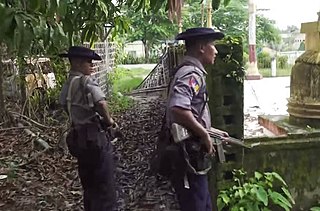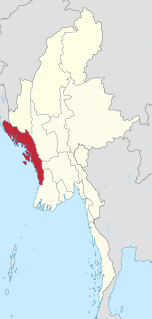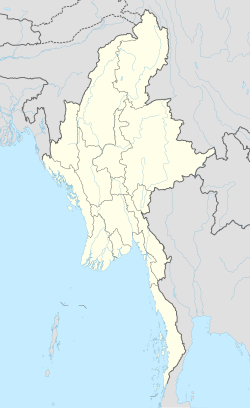
The Rohingya people are a stateless Indo-Aryan ethnic group who reside in Rakhine State, Myanmar. There were an estimated 1 million Rohingya living in Myanmar before the 2016–17 crisis. By December 2017, an estimated 625,000 refugees from Rakhine, Myanmar, had crossed the border into Bangladesh since August 2017. The majority are Muslim while a minority are Hindu. Described by the United Nations in 2013 as one of the most persecuted minorities in the world, the Rohingya population is denied citizenship under the 1982 Myanmar nationality law. According to Human Rights Watch, the 1982 laws "effectively deny to the Rohingya the possibility of acquiring a nationality". Despite being able to trace Rohingya history to the 8th century, Myanmar law does not recognize the ethnic minority as one of the eight "national indigenous races". They are also restricted from freedom of movement, state education and civil service jobs. The legal conditions faced by the Rohingya in Myanmar have been widely compared to apartheid by many international academics, analysts and political figures, including Nobel laureate Bishop Desmond Tutu, a South African anti-apartheid activist.
In Myanmar, terrorism is defined by the country's counter-terrorism law and its subsections, which is interpreted by the Anti-Terrorism Central Committee and enforced by the government of Myanmar. Two groups are currently listed as terrorist organisations in accordance to Myanmar's counter-terrorism law; the Arakan Rohingya Salvation Army (ARSA), which was added on 25 August 2017, and the Arakan Army, which was added on 18 January 2019. The SPDC military government labeled the Vigorous Burmese Student Warriors (VBSW) a terrorist organisation after their role in the 1999 Myanmar Embassy siege, but the group was never officially declared as such by law.
There is a history of persecution of Muslims in Myanmar that continues to the present day. Myanmar is a Buddhist majority country, with a significant Muslim minority. While Muslims served in the government of Prime Minister U Nu (1948–63), the situation changed with the 1962 Burmese coup d'état. While a few continued to serve, most Muslims were excluded from positions in the government and army. In 1982, the government introduced regulations that denied citizenship to anyone who could not prove Burmese ancestry from before 1823. This disenfranchised many Muslims in Myanmar, even though they had lived in Myanmar for several generations.

Maungdaw is a town in Rakhine State, in the western part of Myanmar (Burma). It is the administrative seat of Maungdaw Township and Maungdaw District. Maungdaw is a town of Myanmar and borders Bangladesh. Maungdaw is 16 miles away from Buthidaung. The two towns are separated by the May Yu Mountains and are connected by two tunnels built in 1918.

The Rohingya conflict is an ongoing conflict in northern Rakhine State, Myanmar, characterised by sectarian violence between the Rohingya Muslim and Rakhine Buddhist communities, a military crackdown on Rohingya civilians by Myanmar's security forces, and militant attacks by Rohingya insurgents in Buthidaung, Maungdaw, and Rathedaung Townships, which border Bangladesh.
The 2015 Rohingya refugee crisis refers to the mass migration of people from Myanmar in 2015, collectively dubbed "boat people" by international media. Nearly all who fled traveled to Southeast Asian countries including Bangladesh, Malaysia, Indonesia and Thailand by rickety boats via the waters of the Strait of Malacca and the Andaman Sea.

The Arakan Rohingya Salvation Army (ARSA), also known by its former name Harakah al-Yaqin, is a Rohingya insurgent group active in northern Rakhine State, Myanmar. According to a December 2016 report by the International Crisis Group, it is led by Ataullah abu Ammar Jununi, a Rohingya man who was born in Karachi, Pakistan, and grew up in Mecca, Saudi Arabia. Other members of its leadership include a committee of Rohingya émigrés in Saudi Arabia.

The 2016 Rohingya persecution in Myanmar occurred in late 2016 when Myanmar's armed forces and police started a major crackdown on Rohingya people in Rakhine State in the country's northwestern region. The Burmese military have been accused of ethnic cleansing and genocide by various United Nations agencies, International Criminal Court officials, human rights groups, journalists, and governments including the United States. The United Nations has found evidence of wide-scale human rights violations, including extrajudicial killings, gang rapes, arson and infanticides, which the Burmese government dismisses as "exaggerations".

A series of violent clashes have been ongoing in the northern part of Myanmar's Rakhine State since October 2016. Armed clashes between government forces and members of the Arakan Rohingya Salvation Army (ARSA) have led to sectarian attacks by Myanmar's military and the local Buddhist population against predominantly Muslim Rohingya civilians. The conflict has sparked international outcry and was described as an ethnic cleansing by the United Nations High Commissioner for Human Rights. In August 2017, the situation worsened and hundreds of thousands of refugees fled Myanmar into Bangladesh, with an estimated 500,000 refugees having arrived by 27 September 2017.
The Tula Toli massacre was a mass-killing of Rohingya people that purportedly occurred during a Myanmar Army clearance operation in the village of Tula Toli, Rakhine State, near the Bangladesh–Myanmar border. According to eyewitnesses, Burmese soldiers allegedly carried out the massacre with the support of local Rakhines who also resided in the village. Eyewitnesses claim that at least 200 women and 300 children were killed; however, this has not been verified and there is no official estimate.

On 25 August 2017, Hindu villages in a cluster known as Kha Maung Seik in the northern Maungdaw District of Rakhine State in Myanmar were attacked and 99 Bengali Hindu villagers were massacred, allegedly by Muslim insurgents from the Arakan Rohingya Salvation Army (ARSA). A month later, the Myanmar Army discovered mass graves containing the corpses of 45 Hindus, most of whom were women and children.

Inn Din is a village in northern Rakhine State, Myanmar. The village is in an area of mixed ethnicity, including Rohingya and ethnic Rakhine people. In December 2017, a mass grave with ten Rohingya men was discovered near the Inn Din cemetery. In January 2018, the Myanmar military admitted that its soldiers and Rakhine paramilitaries had killed the ten Rohingyas in September of the previous year.

The 2017–present Rohingya genocide in Myanmar began on 25 August 2017 when the Myanmar military forces and local Buddhist extremists started attacking the Rohingya people and committing atrocities against them in the country's north-west Rakhine state. The atrocities included attacks on Rohingya people and locations, looting and burning down Rohingya villages, mass killing of Rohingya civilians, gang rapes, and other sexual violence.
Rohingya persecution in Myanmar refers to a recurring pattern of persecution of the Rohingya people, a largely Muslim group in Myanmar.
The Gu Dar Pyin massacre was a mass-killing of Rohingya people by the Myanmar Army and armed Rakhine locals that reportedly happened in the village of Gu Dar Pyin, in Rakhine State, Myanmar on 27 August 2017. According to eyewitness testimony and video evidence first reported by the Associated Press, victims of the massacre were buried in five mass graves by the Myanmar Army and burnt with acid. Rohingya village elders recorded a list of 75 people who may have died in the massacre, whilst locals estimate that up to 400 people were killed in the massacre.

The Inn Din massacre was a mass execution of Rohingyas by the Myanmar Army and armed Rakhine locals in the village of Inn Din, in Rakhine State, Myanmar on 2 September 2017. The victims were accused of being members of the Arakan Rohingya Salvation Army (ARSA) by authorities. An investigation by Myanmar's military concluded on 10 January 2018 that there was indeed a mass execution of Rohingyas in Inn Din, marking the first instance where the military admitted to extrajudicial killings during their "clearance operations" in the region.
Rohingya massacres may refer to:
The Maung Nu massacre was a mass-killing of Rohingya people by the Myanmar Army that reportedly happened in the village of Maung Nu, in Rakhine State, Myanmar on 27 August 2017. In February 2018, video evidence emerged allegedly showing government-contracted workers bulldozing parts of Maung Nu, with visible body bags and corpses in the footage.
The Chut Pyin massacre was a massacre of Rohingyas by the Myanmar Army and armed Rakhine locals that purportedly took place in the village of Chut Pyin, in Rakhine State, Myanmar on 25 August 2017, the same day ARSA insurgents attacked security forces along the Bangladesh–Myanmar border. The event was first brought to attention after a report was published by Human Rights Watch, which detailed accounts of rape and killings from survivors.















